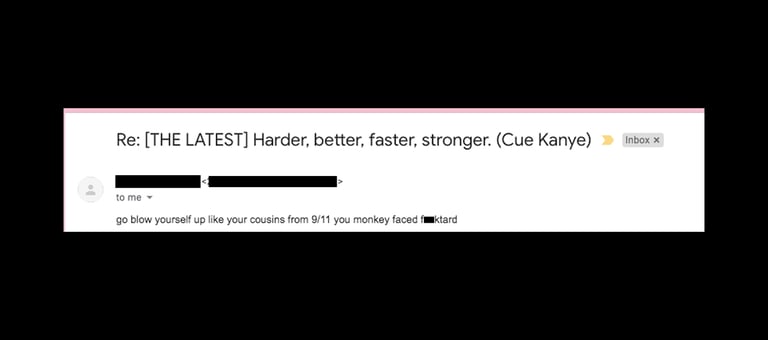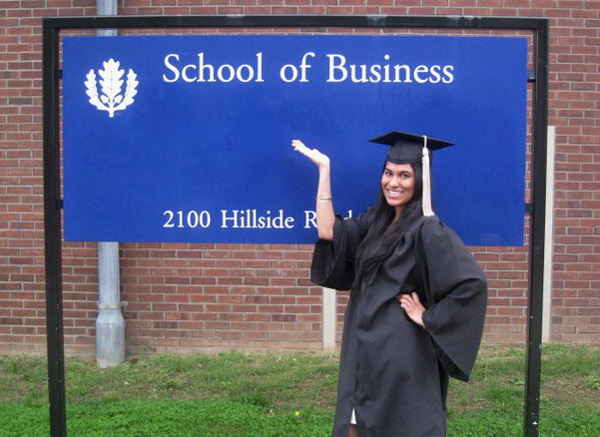Subscribe now and get the latest podcast releases delivered straight to your inbox.
Instead of Unsubscribing, He Called Me a Terrorist.

Jan 31, 2019

My heart stopped as I read the preview text.
Not even the actual message, just the preview text -- and as I clicked open, I had no words.
Every Monday around 8:45 a.m., I had grown accustomed to facing a bloated, “spammy” inbox full of responses to our Saturday issue of THE LATEST — auto-responders in Russian characters, inbox filters, even the occasional pickup line.
I certainly didn’t expect a personal attack.
“go blow yourself up like your cousins on 9/11 you monkey-faced f**ktard.”
 A screenshot of the actual email
A screenshot of the actual email
It was short and ignorant, but it sliced through me like a knife.
I turned around and shook my head with a few of my teammates but my heart began to race, my mind clouded, and I could feel the tears of disgust well.
This wasn’t anything new. I knew this ugliness was in the world.
I had experienced it before, but this was different for some reason.
I didn’t know what to do.
Did I play it cool and let it roll off my back? Did I tell my manager? Did I run to the bathroom to let the angry tears flow?
The email was a response to one discussing HubSpot, Facebook, and Instagram.
Nothing political, nothing socially-charged -- so why did this happen?
Why was I being attacked by a nameless coward, simply for showing my face?
I wasn’t looking for a confrontation.
I wasn’t pushing any sensitive buttons or egging anyone on -- I was doing the same thing I always do when I send out our newsletter.
Nevertheless, I was met with hate.
We Need to Recognize That Racism Is Everywhere; Even in Marketing
That day, I didn’t cry because this man's words hurt. I’m a big girl and no racism is personal.
I wanted to cry because no matter how many times we see these incidents cross our newsfeeds, in headlines, or they stop me in my tracks in everyday life, I’m still appalled.
Racism is not something isolated to politics or the justice system. It is an insidious, ruthless virus that bubbles underneath the skin of many “average” people; many who, we as marketers, communicate with every day.
Even if not attached to hate, there is a great deal of unconscious bias and miscommunication in our society when it comes to race.
It’s considered taboo to discuss it or admit some of us have preconceived notions attached to it, but we do.
Just look at what happened to me.
This man saw a brown face and labeled me.
Obviously, the message was intended to be an attack on Muslims/Arabs (for the record, I’m Indo-Guyanese, raised Hindu), and when I share it with others -- or similar incidents in the past -- the common reaction is, “That’s awful. You’re not even Muslim or Arab!”
-- But even if I was, would that have somehow made this more acceptable?
Now, I know that is not what most people are suggesting when they say this to me.
They’re emphasizing just how ignorant the statement was, but we must remove these ambiguous, “well-meaning” reactions from our lexicon.
They suggest that if he had targeted me accurately, it would’ve been less disgusting.
That if he was a little bit more “informed,” it would have been a fraction more “OK.”
And that couldn’t be farther from the truth.
Reactions like these show just how misunderstood and mishandled racial situations are today.
I believe we can change, but not without facing it head-on like we are right now.
Race isn’t a four-letter word.
It’s a fact of life that needs to be discussed openly and honestly. Race should be embraced and explored fully to establish comfort.
We get squeamish when we acknowledge skin color and the differences between us, so it gets brushed under the rug with rosy adages like, “We're all the same.”
But we shouldn't feel awkward. We should lean into this discomfort and talk about it.
This is a belief that has always guided me as an individual, as well as a marketer.
I’m Used to Being in the Minority & I’ve Always Embraced That Responsibility
When I was in my junior year at the University of Connecticut, I once glanced at my tuition invoice to find I was awarded a $1,000 “Marketing Minority Scholarship.”
I had to laugh.
It was an ongoing joke among my friends that I majored in marketing “because no brown kids went into marketing” -- but I embraced this.
 Yours truly as a freshly-degreed, bushy-tailed marketing grad.
Yours truly as a freshly-degreed, bushy-tailed marketing grad.
All of my classes were seas of white faces, but I was used to it growing up in Connecticut. It just came with the territory.
As I joined the workforce and attended conferences, however, I soon learned just how underrepresented South Asians -- let alone distantly South Asian, first-generation American, Indo-Caribbeans, like myself --are in the marketing industry.
Still, it didn’t faze me.
I didn’t see being a minority in this field as a disadvantage or something to be ignored. It was an opportunity. An opportunity and responsibility to represent.
In 2019, it’s common to see a biracial couple or a minority in a national commercial, but this is a recent phenomenon; one that still catches me by pleasant surprise when I see it happen.
When I started working back in 2011, this diversity was a rare sight in marketing, advertising, and the media in general. I knew I had a fresh perspective, a different walk of life, a new experience to share — and share I would.
As I began creating content, I infused my writing with examples from Bollywood, stories from my family life, and photoshopped vectors of people to make the groups more diverse.
I made “brown jokes” to my team and shared my culture, suggesting we all celebrate Holi in the office.
View this post on InstagramA post shared by Ramona (@fromramonawlove) on
Representation matters and I wanted to do my small part to advance it.
It became a part of my voice and vision as a content creator.
But then there was that email.
This message was a rude reminder that there are still people in the world who don’t want to see diversity or new perspectives.
There are people who just don’t want to see faces or names like mine grace their inboxes.
The inbound marketing industry is often very idealistic, warm, and fuzzy. We preach helping and being genuine.
Unfortunately, even our beautiful, tolerant bubble of existence, can be popped by bigotry, no matter how good our intentions.
Again, in my experience, it comes with the territory.
Vulnerability in Content Marketing
“Write with the door closed, rewrite with the door open. Your stuff starts out being just for you, in other words, but then it goes out. Once you know what the story is and get it right — as right as you can, anyway — it belongs to anyone who wants to read it. Or criticize it.”
- Stephen King, On Writing
When you create content, like any artist, you are putting a piece of yourself out into the world.
We always encourage experts to share their unique perspectives and points of view, but in doing so, they’re also opening themselves up to criticism.
They’re opening a door to anyone and everyone, with a virtual invitation to express their thoughts and feelings on what they shared.
Perhaps some may disagree with your opinions and state so professionally, but others, as my email proved, may feel a need to comment on you personally.
This is both a beauty and a blemish of what we do.
Everyone can have a voice -- but what are the limits, if any?
And if we say there are limits, are they defined by what we should or should not be sharing, or by our capacity to be “thick-skinned” when under attack?
At IMPACT, I strive to help our publication be the most honest, candid marketing resource online. We want to bring you real stories and opinions, not the sugar-coated, best-case scenarios so many others do, but we do so with respect.
Unfortunately, not everyone does.
In content marketing, when you put your name, face, or stamp of approval on something, you become vulnerable to every kind of feedback both solicited or not.
Professional and personal.
Loving and hateful.
In a more volatile social atmosphere.
You Can’t Let This Risk Stop You
You can’t let the risk of being met with hate or disapproval silence your voice; to stop you from sharing your unique experience or shedding light on the world’s ills that are a direct result of turning a blind eye.
I know my words will not change the world or solve anything, but this is the reality we live in.
This is my experience and, sadly, it’s not new or unique. This is the daily experience of millions of people in our country and abroad.
Today, I am a proud brown woman, so I know this man’s racist words and thoughts on those who look like me mean nothing. I'd usually shrug them off. However, if I were younger or perhaps hadn't experienced this type of hate before, I would feel ostracized.
As if I didn’t have the right to get up every morning and exist, let alone do my job and speak my mind.
Racism is alive and well. It’s everywhere -- in the digital world, as well as the marketing world, and this is what it does.
It condemns people purely for existing as God created them. It makes them feel like they have no value as human beings, that their stories and faces don’t matter.
I refuse to be condemned.
One person's ignorance is another’s fuel for change.
Marketers, we need to embrace diversity and inclusion in our ads. Highlight different faces and points of view in our content. Share your unique experiences.
When you go the extra mile to not only acknowledge but embrace diversity, you let millions know they do belong; they are welcome; their pains and needs are valid, and understood by someone other than themselves.
You silence hate mongers like the coward who emailed me. Anonymously, I might add.
As marketers and as citizens of the world, this is all of our opportunity, and frankly, our responsibility to each other.


Order Your Copy of Marcus Sheridan's New Book — Endless Customers!